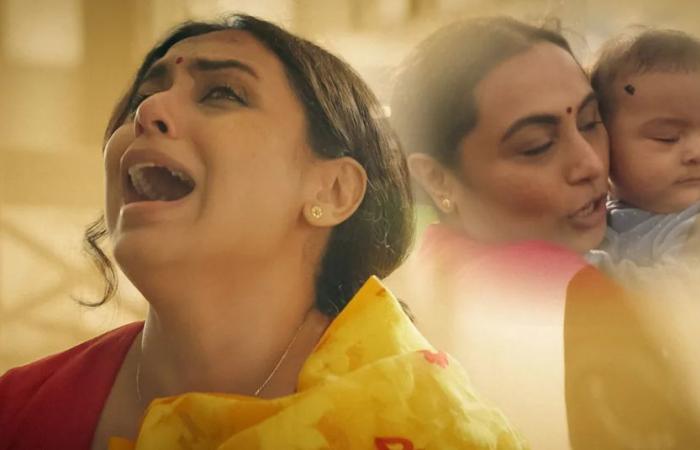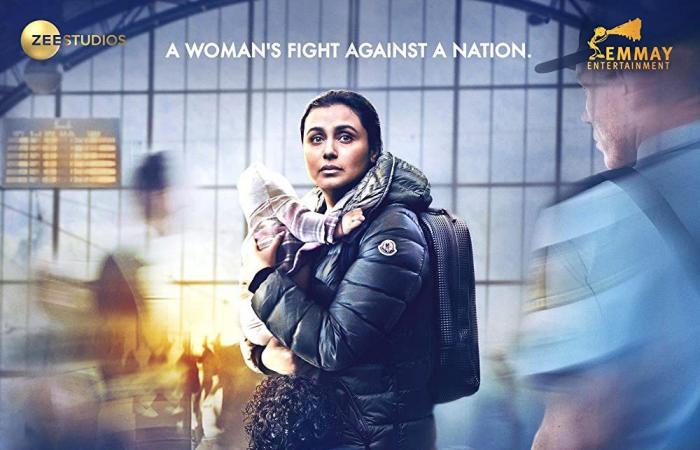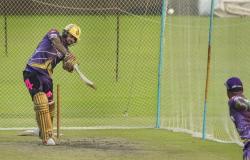Anne Myklebust Odland
The Bollywood film ‘Mrs. Chatterjee Vs. Norway” premieres on 17 March with Rani Mukherjee in the lead role.
The film is based on a true child welfare case about an Indian family in Stavanger.
Family man Anurup Bhattacharya was working as a gene researcher in Stavanger when he and his wife Sagarika Chakraborty were deprived of custody of their two-year-old son and five-month-old daughter in 2011.
The case eventually received explosive media attention and became major politics. Internationally, the case was referred to as “The Nightmare in Norway”.
Background: Norwegian child welfare case becomes a Bollywood film: – I am portrayed as the villain
Several people from Bufdir plan to see the film, says department director for international services, Kristin Ugstad Steinrem.
– It is important for us to see how the film portrays Norwegian child protection, she says.
The department she heads collaborates with other countries’ authorities on matters involving child protection across national borders.
These may be cases where children have connections to another country, either because they have lived there previously or have relatives abroad.
Preparing for debate
Ugstad Steinrem says that employees in the directorate have seen the trailer and are aware that claims are made about Norwegian child protection in the film.
Among other things, the placement of children in foster homes is referred to as a business activity.
She also refers to the movie poster where you see one police officer with gun and that it can create an unfortunate image of how child protection works.
– Such things will be important for the Norwegian authorities to comment on when the film is out, she says.
She says Bufdir is prepared that the film will trigger debate, also among critics of child protection here at home.
– We are preparing for debate in light of the film, even though it is fiction and not a documentary, she says.
Fontene knows that several people who have been involved in child welfare cases are planning to see the film this first film weekend.
The organization for child care parents (OBF) invites, among other things, a gathering after the film to talk about impressions.
– The film is important to many parents. Many have high expectations of how foreign authorities are affected by the film around the world, says Merethe Løland, general manager of OBF.
The story continues below the picture:
The film is based on a true child welfare case about an Indian family in Stavanger.
Screenshot
Will counter disinformation
Kristin Ugstad Steinrem in Bufdir emphasizes that it will be important for the Norwegian authorities to counter disinformation and misrepresentations that could damage Norway’s reputation.
That is why Bufdir works closely with the Ministry of Foreign Affairs and the Ministry of Children and Families on international attention to Norwegian child protection.
Much read: Finnish journalist about Russian internet trolls: – Massive amount of fake news about child protection
– Has the India case on which the film is based been a wake-up call for the Norwegian authorities about what can be the explosive power of a single child protection case?
– That case and the demonstrations against Norwegian child protection around 2015-2016 generated a lot of attention. Now we have a different system for handling child welfare cases across national borders than we had then, says Ugstad Steinrem.
She points out that Norway ratified the Hague Convention in 2016, which contains provisions on cooperation regarding parental authority and measures for the protection of children. Then Bufdir also became the central authority for cases where children have connections to other countries.
– What is different now is that Bufdir is a contact point in Norway. We assist foreign authorities and child protection staff in Norway in cases where children have connections to other countries, she emphasizes.
Assistance can be about obtaining information in a child protection case, implementing a decision from the child protection board, or transferring a case to another country.
200 cases last year
– How can you support employees in child protection to stand by their professional child protection assessments and not be intimidated by international pressure in a case?
– We do not interfere in child welfare professional assessments, but can assist in communication with foreign authorities and inform about the possibilities that lie in the international regulations. We can also guide employees in how they can have a dialogue with foreign authorities without being hindered by the duty of confidentiality, says Ugstad Steinrem.
Cultural differences: “Anna” feels misunderstood in Norway: – I was a good mother in Ukraine
In 2022, Bufdir’s international department was involved in 200 new cases, where either child welfare staff in Norway or foreign authorities received assistance.
After they became a central authority in 2016, they have had an increasing caseload every year.
– There are most cases where child protection services ask for assistance or pass on concerns about a family moving abroad, she says.
Ugstad Steinrem encourages employees in child protection to contact the international department in Bufdir if you have cases where children have relatives in or other connections to another country.
– In such cases, placement in a foster home abroad can be considered as a measure, or the case may have to be transferred to another jurisdiction. And here we can assist, she says.
The gun is visible on the movie poster.
Screenshot
Informs about the regulations
In 2022, Bufdir conducted a seminar on child protection across national borders in several Norwegian cities precisely to increase expertise on this type of matter. Ugstad Steinrem feels that knowledge of the regulations varies and that the number of cases each office has experience with also varies.
Among other things, it can be difficult to assess what authority you have in various matters, depending on how long a child has lived in a country. Citizenship is irrelevant in these cases, while the concept of residence must be investigated.
– We see that there is a need for information on how the regulations in these cases work, says Ugstad Stenirem, who emphasizes that Bufdir can be connected.
– What did the India case teach you about dealing with international issues?
– This case and other cases involving other countries’ authorities have taught us how important good communication is. We are very concerned about that. For example, how to communicate with other countries’ embassies in Norway, says Ugstad Steinrem.
– Answer foreign press
When she spoke to staff in child protection at the seminars last autumn, she said “Pick up the phone when the ambassador calls”.
– Yes, it is important. I would like to emphasize how important it is to show openness and understand the embassy’s role, which is to represent its country’s citizens in Norway. You can gain a lot by establishing a good dialogue from the start. Simple things like answering questions can have a big impact, she says.
Ukrainian Ambassador: – We are familiar with a handful of child welfare cases
She encourages employees in child protection to also respond if foreign press contacts them, and emphasizes that there is a lot they can say about how the system in Norway works without breaching confidentiality.
– Have Norwegian child protection authorities underestimated how individual cases can become big politics?
– It is difficult to answer that, but it is clear that large protests can start with a single case, or with a few cases that create enormous commitment. Therefore, it is of course important how you handle the individual case, she says.
Meetings with the embassies
– How do the Norwegian authorities work for a good reputation for Norwegian child protection?
– Every year we hold seminars with all foreign embassies in Norway to provide information about the system and regulations in Norway and about issues across national borders. It is important to be open to questions and to be available for what other countries’ authorities are wondering, she says.
Common questions they get are about contact. There has also been a need to clarify that it is not the child protection service that makes decisions about taking over care, but that it takes place through a decision in a child protection committee or in court.
– The tribunal is an unfamiliar term and then we have to explain that it is a court-like body that is independent of the child protection service. It is important to bring that out, she says.
Bufdir also has bilateral meetings with other countries’ authorities about how child protection works, among other things there have been meetings with Polish authorities here in Norway.
– We find that other countries also work well with the protection of children, and when other countries are to have trust in us, it is important that we also show trust that other states have good systems, says Ugstad Steinrem.
Tags: Bollywood film Norwegian child protection case draws professionals cinema
-






